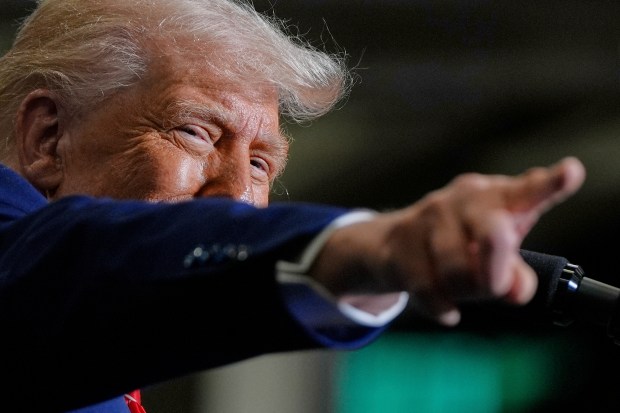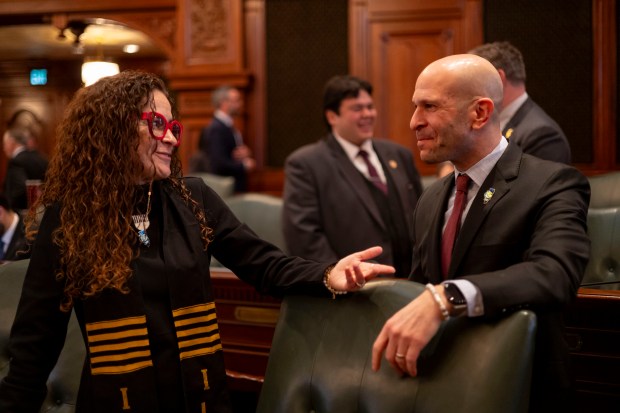As U.S. Steel waits for a decision on its potential acquisition deal by Nippon Steel, local environmental groups say they oppose an investment into the Gary Works facility.
Gary Advocates for Responsible Development and Just Transition Northwest Indiana both on Thursday announced they oppose the Japanese steelmaker’s offer to spend $300 million to reline the Gary Works’ blast furnace.
The groups support a letter from the Sierra Club, a national grassroots organization. The letter, which is addressed to members of Congress, opposes the potential deal.
“Nippon Steel’s revealed plans to extend the life of the most polluting parts of a steel mill currently operated by U.S. Steel leaves no doubt that the company is not acting on climate or accounting for public health,” the letter said.
The blast furnace investment would allow for higher steel production, but local activists say it will continue to rely on fossil fuels. It would also increase the furnace’s life by up to 20 years.
“Blast furnaces will become obsolete in a matter of 15 to 20 years,” said Carolyn McCrady, GARD member. “There is no point in trying to extend the life of a fossil fuel blast furnace at the cost of millions of dollars and continuing to pollute our community.”
GARD would prefer a direct reduction furnace, which McCrady said is a more environmentally and economically friendly alternative. The furnaces use natural gas and could reduce carbon dioxide emissions by half.
Direct reduction furnaces produce about 20% of steel nationwide, McCrady said.
About a dozen large integrated steel mills worldwide are replacing blast furnaces with direct reduction technology, according to GARD. Many are also developing green hydrogen capabilities to make a full transition to zero carbon emissions.
Susan Thomas, legislative and policy director for Just Transition Northwest Indiana, is worried that a blast furnace investment would send steelmaking backward.
“This is an opportunity to go forward with the new sustainable steel technologies coming,” she said. “This could future-proof our jobs and safeguard community health.”
The decision on the pending acquisition will be made at the federal level, Gary Mayor Eddie Melton said in a September statement.
In a statement Friday, Melton said he appreciates GARD’s advocacy and commitment to environmental justice and protecting natural resources.
He believes the potential acquisition will be a “once in a generation opportunity for Gary,” the statement said.
“In my meetings with Nippon, they have made it clear they are supportive of making investments in cleaner, greener steelmaking technology,” Melton said. “I strongly support open talks with Nippon, GARD and other community leaders who have long standing concerns with the environmental and health impacts of the steelmaking process in our community. I am happy to facilitate this discussion.”
The deal between the two companies still hasn’t officially closed, but U.S. Steel had expected it to be official in the second half of the year. U.S. Steel said Nippon Steel plans to invest nearly $3 billion into its union-represented facilities, calling the investment “truly transformative.”
U.S. Steel has two sustainable steels that are produced at its Big River Steel facility in Arkansas. The steel company is the first to announce a net-zero greenhouse gas emissions goal by 2050 and is the first North American steel company to join ResponsibleSteel, a global nonprofit working to make steel more sustainable, according to U.S. Steel.
“Our goals are ambitious and long-term, and we will work to pursue them in a way that benefits our people and the places where we live and work,” said a statement from the company.
Vice President Kamala Harris said in September that she opposes Nippon Steel’s acquisition of U.S. Steel and believes the company should remain domestically owned.
President Joe Biden has said since March that he opposes the acquisition.
“U.S. Steel has been an iconic American steel company for more than a century, and it is vital for it to remain an American steel company that is domestically owned and operated,” Biden said in a March statement.
Thomas believes the government and industries should come together to find a way to make steel more sustainable.
“This cannot be ignored and should not be ignored,” she said. “If it will be ignored, it will be a peril to our jobs and the quality of life here in Northwest Indiana.”




